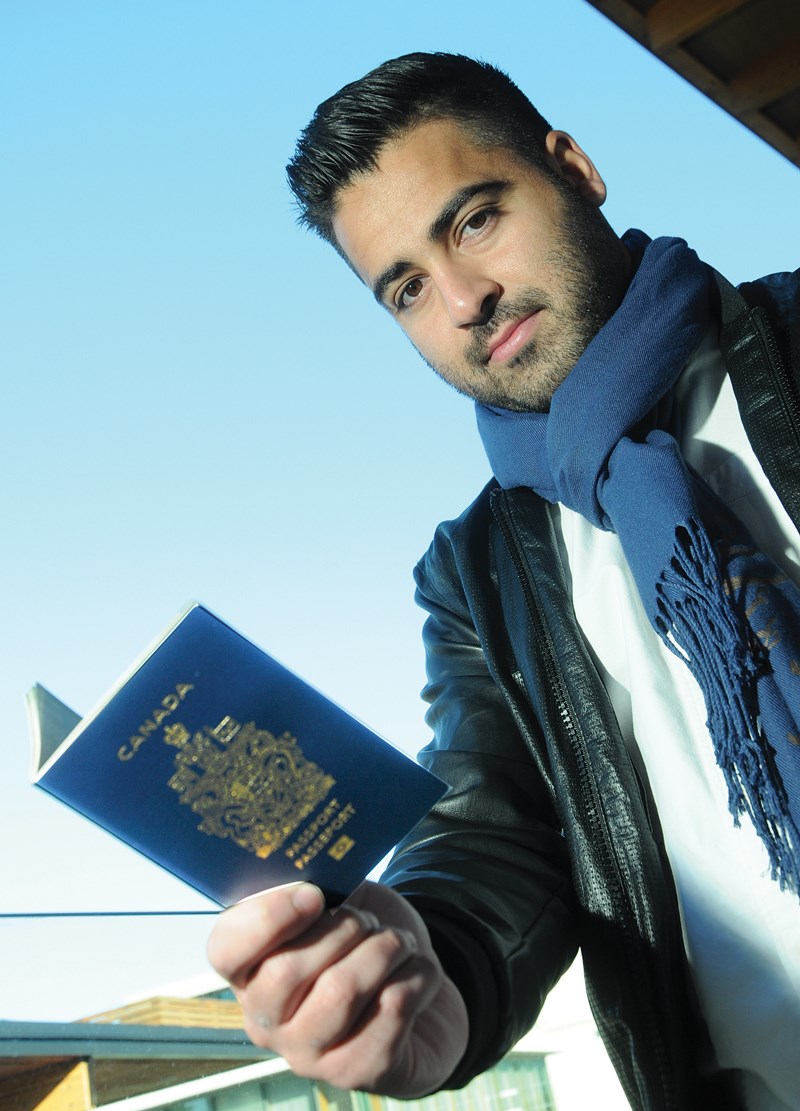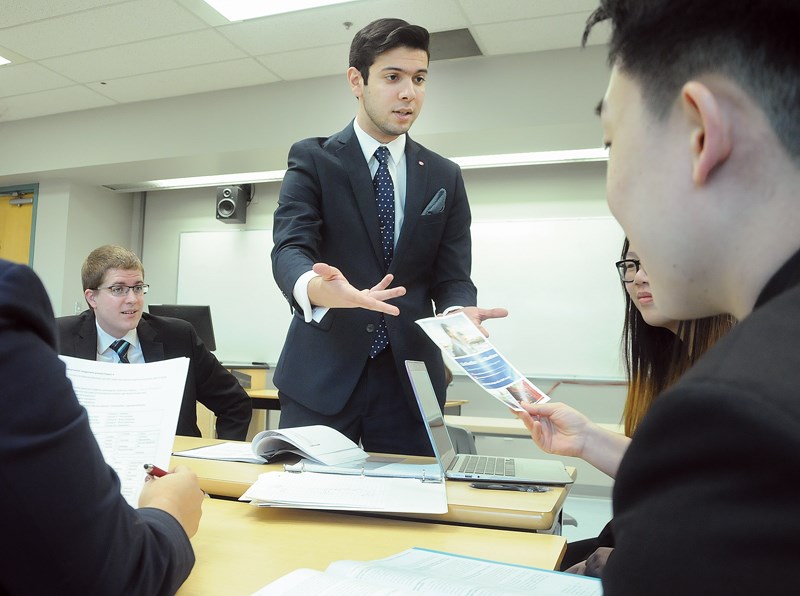Until last weekend, Iraqi Canadian Hamzah Elhassani was set to represent Capilano University at an international collegiate marketing competition in New Orleans in March.
But while Elhassani was in the midst of developing a marketing strategy and preparing to compete against U.S. schools four and five times the size of CapU, U.S. President Donald Trump signed an executive order effectively instituting a travel ban on citizens from seven countries – Iran, Iraq, Libya, Somalia, Sudan, Syria and Yemen.
“My country is one of the seven that are banned,” Elhassani says.
Elhassani, whom CapU marketing instructor Andrea Eby calls “my rock star sales presenter,” has permanent resident status in Canada. He was born in the Philippines but before moving to Jordan, where he spent most of his formative years, he spent one year in Iraq and is still an Iraqi citizen.
He’s planning to apply for a visa to enter the U.S. soon, but – considering that a former Prime Minister of Norway was reportedly detained and questioned at a Washington airport simply because he had visited Iran – Elhassani isn’t hopeful things will be worked out by mid-March.
“It’s the idea of not being able to pursue my career or my future and losing such a great opportunity because you never know what’s going to happen in that conference,” he says. “It’ll be definitely a total loss if I don’t make the trip.”
The American Marketing Association attracts the best students from the best schools, and offers tremendous networking opportunities, according to Eby.
“We never, in Vancouver, would have Google presenting to us in a room of 50,” she says.
“It’s a great opportunity to network with people from all around the world,” Elhassani agrees.
One of the reasons he wanted to go was: “to represent my country, Canada, and also my country Iraq.”
The seven-nation blacklist has left the team facing uncertainty.
“We’re in limbo here, like I guess a lot of the world is. It’s a real shame what’s happening,” says Eby.
Elhassani says he just wants to pursue his passion without being lumped in with extremists.
“We’re in 2017 … we should be accepting each other, we should be welcoming each other … rather than discriminating,” he says.
North Shore MPs spent much of last weekend – the first weekend the new travel ban was in place – scrambling to come up with answers about what it means for constituents.
“Last Saturday I had an open house,” says West Vancouver Sunshine Coast MP Pam Goldsmith-Jones. “The number one thing everyone wanted to talk about was President Trump.”
More specifically, local residents who are dual citizens of Iran and Canada wanted to know if they’d still be OK to travel to the U.S. on business and how the ban might impact extended family members.
“This affects everyone in their daily lives,” Goldsmith-Jones says.
North Vancouver MP Jonathan Wilkinson says his office has also heard from people who are concerned or confused about the new travel restrictions. He has advised constituents to meet with his constituency staff who will check directly with Canadian consular officials in Ottawa about their specific situation.
“It’s a confusing time for a lot of people,” Wilkinson says.
Both Wilkinson and Goldsmith-Jones say their understanding is that dual citizens entering the United States on a Canadian passport should not have a problem. Citizens of one of the seven flagged countries who have permanent residency in Canada should also not have a problem travelling to the U.S. say Wilkinson and Goldsmith-Jones.
But Zool Suleman, an immigration lawyer who has worked with many people in the North Shore Iranian community, says sometimes the situation at the border and at airports isn’t as clearcut as Canadian officials suggest.
Dual citizens who were born in one of the seven countries subject to U.S. restrictions shouldn’t be surprised if they face extra questioning and security screening resulting in delays, he says.
The status of permanent residents from those countries is also murky, he says, despite assurances from Canadian consular officials. “Just because you have Canadian permanent resident status doesn’t mean you have the right to enter America,” he says. It’s possible permanent residents will have to apply for a visa, he adds.
Those with temporary status in Canada – who are here under work or student visas – probably won’t be allowed into the U.S. while the restrictions are in place, he says. “Do not travel to the U.S. if you are from one of the seven countries and have temporary status.”
Nick Hosseinzadeh, who came to Canada as a two year old and holds dual citizenship in Iran and Canada, is another North Shore resident concerned about the travel ban.
Hosseinzadeh, who works as a constituency assistant to North Vancouver Seymour MLA Jane Thornthwaite, says he hasn’t been back to Iran since his family left the country and he doesn’t have an Iranian passport. But technically, he is still a citizen of Iran and his Canadian passport still lists Tehran, the capital of Iran, as his place of birth.

That has created problems in the past, he says – even before the latest travel ban.
“Whenever I travel to the United States and some countries in Europe, it’s definitely a point of contention,” he says. In some cases, Hosseinzadeh says he hasn’t been able to check in to flights online. Other times he has been pulled aside and asked extra questions. “It just gets annoying,” he says. “I even have a Nexus card which makes the whole thing a bit unsettling.”
“One of the questions I always get asked is ‘When was the last time you were in Iran?’”
Hosseinzadeh says he expects that kind of scrutiny to ramp up in the wake of the executive order.
Hosseinzadeh adds he wishes the Canadian government would change the rule requiring the place of birth to show up on Canadian passports.
Some countries substitute a “place of origin” – meaning a person’s current residence, instead, he says.
“I had no choice about where I was born but I chose to be a Canadian,” he says. “I identify as a Canadian. I don’t understand how where I was born matters to my travel documents.
“I live in North Vancouver. That’s where I’m from.”
Hosseinzadeh says he anticipates extra hassles for all Iranian dual citizens and permanent residents heading in to the U.S. under the Trump administration, especially those who have recently travelled to Iran.
Hosseinzadeh says the jury’s still out on whether he’ll have problems getting in to the U.S. to attend a family member’s wedding in California this summer.
“Obviously it’s my hope I’ll be able to travel there,” he says. But a part of him also wonders: “Do I really want to go to a country where people like me aren’t made to feel welcome?”
Elizabeth Jones, executive director of the North Shore Multicultural Society, says she understands that sentiment.
“There’s total confusion going on in terms of the Iranian community,” she says. Immigrants from Iran make up a sizable portion of relative newcomers to the North Shore. Even when people are told they should be OK to enter the U.S., many people fear being targeted and harassed by border officials. Concerns aren’t just about people’s legal status but also “the vulnerability people are feeling,” she says. “All of a sudden people are being targeted.”
That attitude has filtered down to some of the general population in disturbing ways – even in the Lower Mainland and on the North Shore, she says.
“Because of the entire Trump situation, people feel free to express their racist views in public.”
“The general population are feeling powerless,” she added. “It’s a mess right now.”
That situation is doubly concerning for potential refugees.
In addition to the 90-day travel ban on citizens from the seven named countries, Trump’s executive order also places a 120-day ban on the U.S. admitting refugees.
That has led some critics to suggest Canada should revisit its Safe Third Country Agreement with the United States. Under the agreement, Canada is required to turn away refugees and asylum-seekers coming from the U.S., under the understanding that the U.S. is a safe country for refugees that will process their applications fairly.
Suleman is one of those who believes the agreement should be re-examined. “It appears that America is not complying with portions of the (United Nations) refugee convention,” he says.
“Current actions seem to suggest America is targeting people on the basis of religion and ethnicity.”
Suleman says to step down from the agreement will have consequences for Canada. “If we opt out of the agreement we’ll see a significant rise in refugee claims at our land borders,” he says. The U.S. may also retaliate on the trade front, he says.
Wilkinson says the government of Canada has made its own views on immigration and refugees clear.
“I’m not sure it’s necessarily the role of the Canadian government to speak in terms of condemning or praising the American president who’s been elected by the American people, but certainly we have a different view as to what should happen in our own country,” he says.
Wilkinson says until there is some evidence of additional problems being faced by asylum seekers within the U.S., there is no need for the Canadian government to take additional action.
Goldsmith-Jones agrees, adding it’s important acknowledge that the economic and security interests of Canada and the U.S. are deeply intertwined and that involves the two countries maintaining a close relationship.
Meanwhile, Suleman says immigrants in Canada aren’t the only people he’s been hearing from since Trump’s travel ban went into effect. Americans and immigrants currently living in America have also been making inquiries, he says.
“There’s been a significant increase in people looking to get out or looking at alternatives in Canada,” he says. “Americans are unhappy with their government. They want to get out.”



